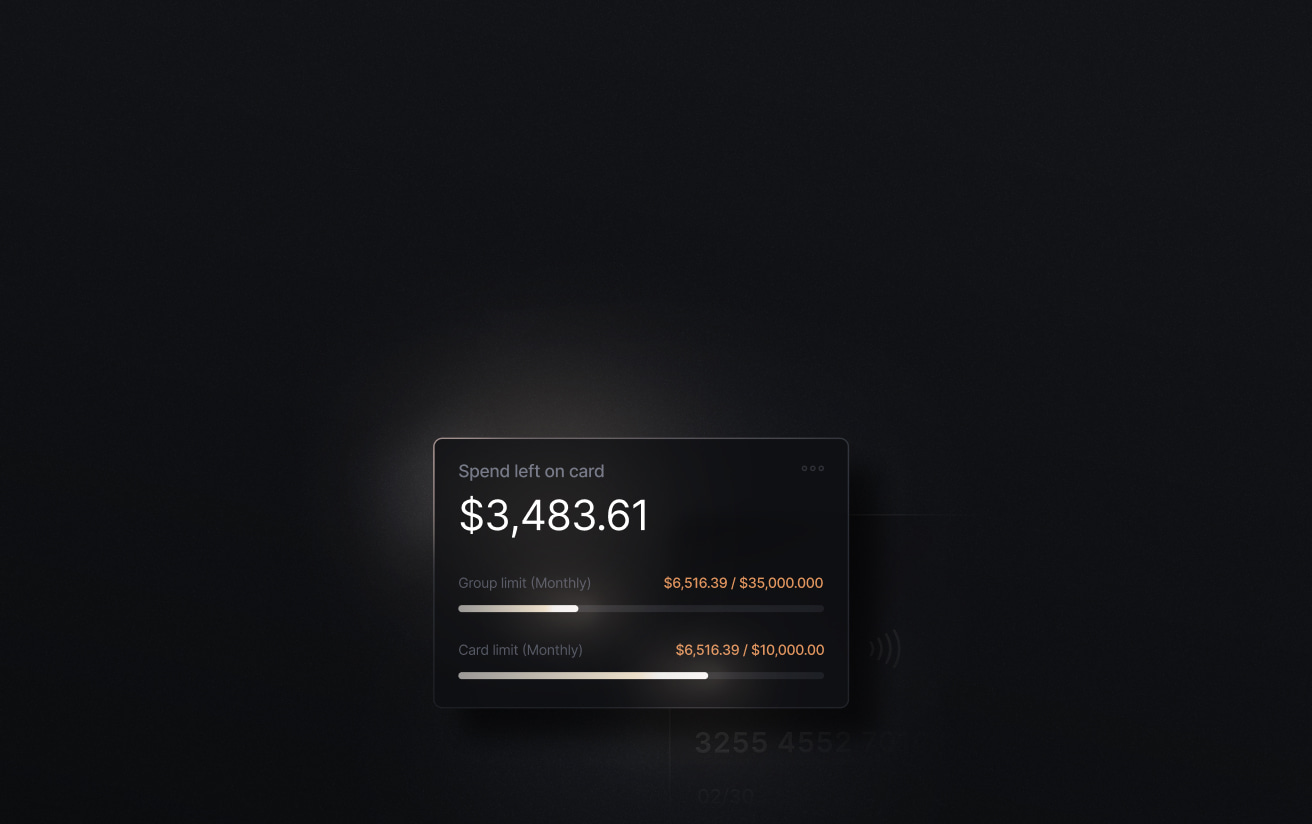
7 top crypto payment processors, and how to choose the best for your business
Letting customers pay with cryptocurrency opens your business to a growing global market and a host of practical advantages. A crypto payment processor—software that lets you accept crypto payments—handles everything behind the scenes, including verifying the transaction and delivering the funds. By integrating one into your checkout, you can leverage the low transaction fees and faster settlement times enabled by the blockchain.
However, accepting crypto payments is just the first step. To fully capitalize on the advantages of cryptocurrency, pair your payment processor with a crypto-capable financial management platform like Slash. While processors handle customer-facing transactions, Slash allows you to manage your business banking and crypto holdings side-by-side.¹ With Slash, you can easily convert assets between crypto and fiat currencies with built-in on/off ramps, send payments through banking rails or on-chain transfers, and hold digital assets in a dedicated company wallet.⁴
Each tool plays a different role in the payment stack, and understanding how they fit together helps you build a complete system that maximizes the operational and financial advantages of cryptocurrency. In this article, we’ll explore what crypto payment processors do, compare the top crypto payment gateways available today, and outline the criteria for choosing the right provider. We’ll also show how Slash complements these processors by powering global payouts, conversions, and multi-rail transactions. Continue reading to learn more.
What are crypto payment processors and gateways?
A cryptocurrency payment gateway and a cryptocurrency payment processor work together but serve different purposes. Both sit between the customer's wallet and the merchant's bank or crypto account, but they handle different parts of the payment flow. The entire process, from the moment a customer places an order to the time they pay for it, is often referred to as the order-to-cash (OTC) process.
The payment gateway is the front end, or the interface your customer interacts with. It creates the payment request, displays the wallet address or QR code where the customer should send their crypto, and confirms that the correct amount was received. Think of it like the card reader at a checkout counter.
The payment processor is the back end, or the behind-the-scenes infrastructure. After the payment is detected, it settles the transaction on the blockchain, converts the funds if needed, and completes the steps required to move the money into your bank account or crypto wallet.
Here’s some additional information about what’s going on behind the scenes:
- Receiving crypto from a customer: The processor generates a unique crypto wallet address (which is often displayed as a QR code) with information about the merchant’s receiving account. The address is used as a unique identifier to route a customer’s payment, much like a bank account number. The processor then monitors the blockchain to confirm when the funds arrive at that address.
- Handling wallet interactions and private keys: A private key is a cryptographic password that proves ownership of a crypto wallet and allows you to move funds in and out of it. If you lose your private key, you permanently lose access to those funds; there's no "forgot password" recovery option. Some processors manage these keys on your behalf, so you don't have to worry about the technical complexity or risk of losing access to your funds, while others give you more flexible control of your keys.
- Managing conversions: There are three types of assets that are important here: fiat currency, cryptocurrency, and stablecoins. Fiat currency refers to government-issued tender that isn’t backed by a physical commodity (USD, GBP, EUR); cryptocurrencies are digital assets on the blockchain with values determined by supply and demand (Bitcoin, Ethereum); stablecoins are a form of cryptocurrency that are equivalent in value to another currency or commodity, like the US dollar (USDC, USDT). Processors can convert one asset class into another during the OTC process.
- Supporting compliance requirements: Processors handle compliance workflows like Know Your Customer (KYC), which verifies customer identity, and Anti-Money Laundering (AML) monitoring, which flags suspicious transaction patterns. Automating these measures can help keep your business legally compliant, protect you from regulatory penalties, and reduce the risk of fraudulent transactions.
- Sending payouts in fiat, stablecoins, or other digital assets: After receiving payment, the processor transfers funds wherever you specify. You could have funds deposited into your bank account as fiat currency, or you could use a crypto wallet to hold either stablecoins or the cryptocurrency used during the transaction.
In practice, most crypto payment services combine both the functions of a payment gateway and a processor; when we refer to "payment processors" in this article, we're talking about solutions that handle the entire OTC process, including the gateway.
What are the best cryptocurrency payment processors?
Each payment processor on this list can handle the core function of enabling customers to pay with cryptocurrency at checkout and ensuring those funds reach your business account. However, they differ significantly in features, ease of use, and overall flexibility. Some processors focus on broad compatibility with hundreds of digital assets, while others emphasize a simpler, more streamlined payment experience with fewer customization options.
Below are our picks for the seven best crypto payment processors available today, along with explanations of the types of businesses they’re best suited for and how easy they are to implement:
NowPayments
NOWPayments supports a wide range of cryptocurrencies for payment: over 300+ coins and 75+ fiat-backed stablecoins. It charges a low 0.5% fee for transactions that don’t require conversion and up to 1% when conversion is involved. The platform is known for offering services to higher-risk industries like gambling, trading platforms, and adult services, though this may come with tradeoffs in compliance rigor. Setup can be more technical than competitors because it is primarily API-based and requires some developer configuration.
Coinbase Commerce
Coinbase Commerce lets customers pay with any digital currency supported in their Coinbase wallet, making it a highly accessible crypto payment method for both customers and merchants. It integrates with WooCommerce, Primer, Jumpseller, and other ecommerce platforms. However, Coinbase Commerce does not automatically convert crypto to fiat currency; it converts payments only into USDC, requiring a separate off-ramp to convert into fiat money for a business bank account. It’s a good option for merchants focused on accepting crypto, but less optimal for businesses looking for native fiat settlement.
BitPay
BitPay can process online and in-store crypto payments, offering a dedicated checkout app for brick-and-mortar retailers. It connects to global bank rails like ACH, SEPA, and FPS and price-locks transactions at initiation to protect merchants from crypto price volatility. With ready-made ecommerce plugins, hosted payment pages, and strong integration support, BitPay is a practical and easy-to-implement processor for merchants.
CoinGate
CoinGate supports 11 major cryptocurrencies and stablecoins, but it notably does not support USDT—the most widely traded stablecoin and a standard for USD-pegged transfers. CoinGate does offer automatic withdrawals from your CoinGate wallet to your bank account and a smooth refund system that repurchases crypto and returns it to the customer’s wallet. Settlements are available in USD, EUR, and GBP. The platform also integrates with ecommerce tools like Wix, WooCommerce, and OpenCart, making it accessible for digital merchants.
PayPal
PayPal is a widely recognized consumer payment brand and extends that familiarity into crypto. Its Enterprise Payments and Hyperwallet solutions support crypto payment processing, alternative local payment methods, and global payouts. Businesses can integrate crypto payments directly into PayPal’s POS or ecommerce checkout. PayPal supports automatic conversion for 100+ cryptocurrencies available within its ecosystem. The main drawback is reduced flexibility; since you don’t control your private keys and settlements occur entirely within PayPal’s closed ecosystem, it can be difficult to move your crypto off the platform.
BVNK
BVNK automatically converts incoming crypto payments to USD, EUR, GBP, and other supported currencies, helping businesses avoid volatility. It offers multi-currency wallets for both fiat and stablecoins, invoice tools, and integrations with platforms like PaymentIQ, Praxis Checkout, BridgerPay, and Stratified. It’s designed with global and fintech-forward businesses in mind. The primary limitations depend on region; available features and supported currencies vary by jurisdiction.
Stripe
Stripe doesn’t support crypto payments out of the box in the same way as other processors. Instead, U.S. businesses can configure stablecoin payments (currently USDC on compatible chains) through the Stripe Dashboard or API. Customers can pay using stablecoins, but merchants receive USD settled into their Stripe balance. Stripe’s extensive ecosystem featuring 24 traditional payment methods, bank rails, and fraud tooling makes this appealing for companies already using Stripe; however, crypto processing requires more technical setup for comparatively limited functionality.
Slash: Powering the operations behind crypto payments
Slash is not a payment processor; it’s the post-payment operational layer that helps businesses actually put their crypto to work. While payment gateways focus on checkout and capturing the transaction, Slash handles everything that comes next: moving funds, converting between currencies, and enabling fast payments across both traditional bank rails and blockchain networks. Slash is a complement to processors that offer limited conversion, settlement, or asset-handling features.
With Slash, you can on-ramp cash from your bank account into stablecoins like USDC and USDT, then use any of eight supported blockchain networks, including Ethereum and Base, to send or receive those assets without leaving the Slash dashboard. By using Plaid to link additional accounts to the Slash dashboard, you can pull funds from multiple sources and convert them into crypto, allowing you to use capital from across your business on the blockchain. When you need cash, you can off-ramp stablecoins back into USD and send funds via ACH, domestic wires, international SWIFT, or real-time payment networks.
The standard in finance
Slash goes above with better controls, better rewards, and better support for your business.

How do I select a cryptocurrency payment processor for my business?
Selecting the right cryptocurrency payment processor starts with understanding how your business operates and what your customers expect. Some bespoke functionalities your business may look for include automatic crypto-to-fiat conversions, support for international payments, or security and custody preferences; plus, the technical skill level of your team can play a role in determining the best fit. Evaluating these needs upfront makes it easier to choose a processor that aligns with your existing workflows and long-term payment strategy. Here are the key criteria to consider:
- Multiple supported cryptocurrencies: Look for processors that accept major assets like BTC, ETH, USDC, USDT, and other widely used cryptocurrencies so customers can pay with the currency they prefer. Also think about which cryptocurrencies you’re willing to accept for payment, as crypto can be volatile in value and may generate losses from a transaction if they are not converted during a sale.
- Fiat settlement options: Some payment gateways settle directly into your bank account in USD, EUR, or other fiat currencies. Others may settle into the cryptocurrency used for payment or into stablecoins. Platforms like Slash allow you to hold, exchange, and move fiat and stablecoins interchangeably through built-in on/off ramps, giving you greater flexibility in treasury management.
- Transaction and conversion fees: Crypto transaction fees are typically low, often around 1%. However, you should also watch for crypto-to-fiat conversion fees and bank network fees for deposits or withdrawals. With Slash, you can convert stablecoins like USDC and USDT into US dollars for less than a 1% fee, with funds typically reaching your business account in about one business day.
- Custodial vs. non-custodial: This choice depends on your business’s security and operational preferences. Custodial processors and wallets manage your private keys for you, providing convenience and built-in compliance but less direct control over your assets. Non-custodial options give you complete control of your keys and funds, along with stronger privacy and deeper integration potential; however, they require more technical management and carry greater risks if keys are mishandled.
- Integrations and additional tools: Payment gateways that integrate with third-party hosts like Shopify, WooCommerce, Magento, or custom APIs can make it significantly easier to accept payments in crypto on your storefront. Other features to look for include invoice generation, ecommerce plugins, mobile checkout, and POS support.
- Multi-jurisdiction licenses: If you serve international customers, choose processors with licensing across multiple regions. Examples include U.S. money transmitter licenses (MTLs), a FinCEN MSB registration, UK FCA registration as a cryptoasset business, EU VASP registrations, or Licencia de Activos Virtuales in markets like Mexico or Brazil.
Manage digital payments with ease with Slash
Offering a crypto payment option at checkout is valuable, but the real business impact comes from what happens after the payment. This is where Slash can help. Unlike a crypto payment processor, Slash acts as the post-payment operational layer that helps you move, convert, and deploy digital assets across your global financial workflows.
Slash turns incoming USDC, USDT, and other crypto assets into usable capital. You can manage treasury, pay vendors, and operate across borders with far greater speed and flexibility than traditional banking rails allow. Here are some capabilities that Slash enables for your business:
- Stablecoin transfers: Send and receive USDC and USDT directly within your Slash business account. Funds automatically pull from your balance and convert into the crypto of your choice, or back into fiat currency, so you can move money across blockchain networks or bank accounts with ease.
- Fast, low-fee crypto-to-fiat conversions: Convert stablecoins into cash for less than a 1% fee, with funds typically deposited into your business bank account within one business day.
- Slash Global USD: Non-U.S. entities can hold USD, access a stablecoin wallet, and unlock diverse global payment options without forming a U.S. LLC. This makes it easier for international teams to transact in USD and participate in global commerce.7
- Multi-entity and multi-storefront management: Consolidate information about your payments and receivables from multiple payment processors, storefronts, and subsidiaries.
- Crypto-friendly business banking: Whether your funds start as stablecoins or traditional deposits, Slash makes it easy to convert them into usable cash with built-in on/off ramps. You can move money with ACH, domestic wires, SWIFT to 160+ countries, or real-time payment networks like RTP and FedNow. Any fiat you hold in a Slash business account is placed into an FDIC-insured sweep network that provides millions of dollars in protection.2
Accepting crypto is just the first step. Slash turns cryptocurrency into spendable, actionable capital across your entire business.
Learn More and Apply in Less Than 10 Minutes Today
Join the 3,000+ businesses already using Slash.
Frequently asked questions
Can my business accept stablecoins but settle in fiat?
Yes. Many crypto payment processors allow businesses to accept stablecoins or cryptocurrencies at checkout and automatically convert them into fiat currency such as USD, EUR, or GBP at the current market rate. The converted funds are then deposited into your bank account. However, not all processors offer automatic conversion, so review each gateway’s settlement options to ensure they align with your accounting and treasury needs.
Fiat vs Crypto: What’s the Difference and Why it Matters
How to Accept Crypto Payments for Your Business
Do stablecoin payment gateways support cross-border payments?
For customers, yes. Stablecoin-enabled payment gateways let buyers pay in crypto from around the world, though availability may vary by region depending on local regulations and processor support. Most crypto payment gateways, however, are designed strictly for checkout and do not provide tools for sending B2B cross-border payments. Slash fills this gap by enabling businesses to send USDC and USDT cross-border on eight widely used blockchain networks without the delays, FX markups, or fees associated with traditional banking rails.
Cross-Border Payments Guide: Choosing the Right Solutions
What are the main challenges of stablecoin checkout?
Common challenges include limited support for multiple cryptocurrencies or stablecoins, steep technical requirements for integrating more customizable API-based processors, and the difficulty of managing reliable on/off ramps for converting between digital assets and fiat currency. Slash’s stablecoin support is easy to understand, featuring built-in conversion ramps and access to fast, low-fee transfer on the blockchain.












